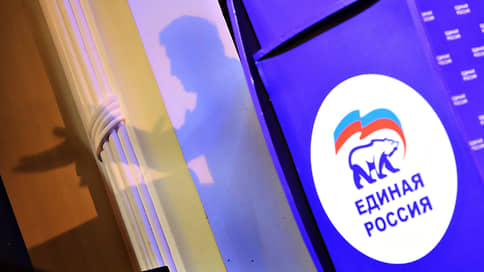United Russia decided on candidates for deputies in the new territories
[ad_1]

United Russia put forward lists of candidates for parliamentary deputies of four new subjects – the Donetsk and Luhansk People’s Republics (DPR and LPR), as well as the Zaporozhye and Kherson regions. As Kommersant expected, together with the governors they were led by military commanders, social activists and federal politicians. Experts believe that the party in power dominates in these territories and the vote should be perceived more like a referendum.
The list of United Russia (ER) candidates for the election of deputies of the People’s Council (NS) of the DPR included 130 people. Its leaders, as previously suggested by Kommersant (see Kommersant of June 5), were the acting head of the republic, the secretary of the local party cell Denis Pushilin, the commander of the Sparta battalion, Hero of Russia Artem Zhoga (father of the deceased battalion commander Vladimir “Vokhi » Zhogi), as well as the general director of the Republican Center for the Protection of Motherhood and Childhood Anna Zheleznaya.
According to the party, 62% of candidates for the Donetsk parliament are its members, 22% have combat experience (special operation participants), 18% are young people (under 35). In the professional context, the majority – 26% – are state employees (teachers, doctors, cultural workers and housing and communal services), another 21% are entrepreneurs, and 15% are social activists.
Recall that the parliaments of all four new subjects will be formed according to the proportional system, that is, the mandates will be distributed among the lists of candidates in accordance with the number of votes received by each party. There will be no single-members or regional groups within the lists in these elections. 90 deputies will be elected to the National Assembly of the DPR, 50 to the National Assembly of the LPR, 40 to the Legislative Assembly of the Zaporozhye Region, and 36 to the Kherson Regional Duma.
The list of United Russia candidates for the Luhansk National Assembly includes 75 people, and it is headed by the acting head of the LPR Leonid Pasechnik, the secretary of the local unit of United Russia, the current speaker of parliament Denis Miroshnichenko, as well as State Duma deputy Viktor Vodolatsky in charge of the region. The party representation here is much higher: 96% of the applicants are immediately members of United Russia. In addition, almost 50% of them are acting Lugansk deputies (in the DPR and LPR there are parliaments formed during the self-proclaimed independence; there are no legislative bodies in the Zaporozhye and Kherson regions yet). At the same time, the number of candidates with combat experience is somewhat less here – 17%.
United Russia nominated 60 people for the elections to the Legislative Assembly of the Zaporozhye region. The list was headed by Acting Governor Yevgeny Balitsky, secretary of the local party cell Galina Danilchenko and chairman of the movement “We are with Russia” Vladimir Rogov. United Russia comprises 40% of the candidates, but only 5% of them are members of the special operation (SVO).
Finally, EP nominated 50 candidates to the Kherson Regional Duma. The list was headed by Acting Governor Vladimir Saldo, State Duma deputy, secretary of the regional branch of the party Igor Kastyukevich, and director of the Novaya Kakhovka bakery Elena Dmitruk. Among the Kherson candidates, the least number of participants in the SVO is only 4%, but the largest number of entrepreneurs is 26% at once. The party consists of 60% of contenders for deputy mandates.
Recall that on September 10, residents of the new regions will also have to elect deputies of representative bodies of municipalities. But they will not have to choose governors: the heads of the subjects will be approved by regional deputies from the candidates submitted by the president.
The nomination of lists of candidates for parliaments of new subjects will last until August 17. According to the GAS “Vybory”, in addition to United Russia, the liberal democrats have already managed to do this. The LDPR lists are traditionally headed by its leader, Leonid Slutsky.
The president of the Minchenko Consulting communications holding, Yevgeny Minchenko, points out that the party has maintained a unified format for the formation of “troikas” in all four regions: “Everywhere the same logic is there: there is a governor, there is a representative of the warring elite and there is a representative of the social front, in three cases – it’s women.” The expert has no doubts that the declared politicians will cope with the set electoral tasks: “The sociology that I have seen shows the dominance of United Russia in all four regions, and all the other parliamentary parties are hanging out somewhere – near the five percent barrier “.
Oleg Bondarenko, director of the Progressive Policy Foundation, recommends first of all to pay attention to the conditions in which the election cycle takes place: “These will be elections under martial law with all the ensuing consequences: the absence of actual competition and all other nuances and circumstances. Rather, it will be some kind of legitimization of the current government through – as far as possible in such conditions – a transparent vote. Therefore, Mr. Bondarenko argues, the personal composition of candidates is not so important: “In its pure form, this is not an election, but a referendum under martial law. This is how it should be taken.”
Also in September, elections to local self-government bodies will be held in the new territories, for which the United Russia nominated 2,086 candidates: 595 in the DPR, 800 in the LPR, 319 in the Kherson region, 372 in the Zaporozhye region. Elections to LSG bodies will also be held according to party lists.
[ad_2]
Source link








